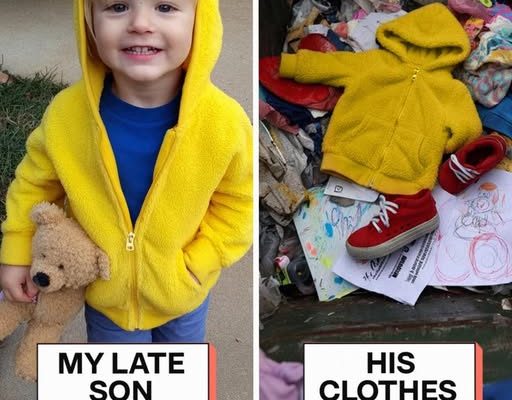Two years after losing my son, the only tangible pieces of him I had left fit inside a small cedar chest — his hoodie, sneakers, drawings, and a silver bracelet that once belonged to my grandmother. That chest was sacred. It was all I had left of him.
My son, Caleb, was five when he died — a bright, sweet boy who loved dinosaurs and drawing our family as superheroes. One second, he was chasing bubbles in our backyard, laughing that infectious little laugh. The next, I was screaming into the phone for an ambulance. My husband Ethan lost a son that day. I lost my entire world.
Grief changes everything. You keep breathing, but life becomes mechanical. I worked, ate, and slept — but nothing felt real. The only time I felt him close was when I opened that cedar chest and held his hoodie, still faintly smelling of bubblegum shampoo.
My mother-in-law, Lorraine, never understood grief — or maybe she just didn’t care. She was controlling, cold, and always ready with judgment disguised as “advice.” A few months after the funeral, she told me, “It’s unhealthy to keep his things. God needed another angel — it’s time to move on.”
I ignored her — until the day she crossed a line I can never forgive.
One evening, I came home from work and noticed something off. The house felt… empty. When I went into our bedroom, the cedar chest was gone. My stomach dropped. I tore through every room, calling for Ethan, panicking. Then I heard the garbage truck outside.
I ran to the garage — and there it was: a black trash bag tied neatly, like a gift. Inside were Caleb’s things — soaked in coffee grounds, tangled in trash, his drawings crumpled like junk mail. His hoodie was smeared with food scraps. I screamed until my voice broke. Ethan ran in, horrified.
Then Lorraine walked in, calm as ever. “I did what you were too weak to do,” she said coldly. “He’s gone. You need to let go.”
“You threw him away?” I whispered.
“They were just things,” she shrugged. “Garbage.”
Ethan exploded, kicking her out, but the damage was done. That night, holding that filthy hoodie, something inside me hardened. I wasn’t going to scream or cry anymore. I was going to end this.
A few days later, I realized something else was missing — Caleb’s silver bracelet. Then, at a family barbecue, I saw it on Lorraine’s wrist. When I asked where she got it, she lied — said it was a “gift from a friend.” My gut told me otherwise.
I started calling pawn shops, and one owner recognized her instantly. He showed me a receipt — her signature, the date, and a description of Caleb’s bracelet. She’d sold it for forty-three dollars.
That was the moment I decided how she’d pay.
Three weeks later, I invited the entire family for dinner — Lorraine, my father-in-law Mike, Ethan, and his sister Lily. I cooked her favorite meal and smiled through every bite. Then, halfway through dinner, I stood up and said, “I want to show you something.”
I turned on the TV and played a nanny cam video I’d hidden in our guest room — footage of Lorraine rummaging through my drawers, taking the cedar chest, muttering about how I “needed help.” The room went silent. Ethan dropped his fork. Mike’s face went pale.
When Lorraine tried to defend herself, I slid the pawn shop receipt across the table. Her signature glared back at her. “You sold my dead son’s bracelet for forty-three dollars,” I said quietly.
Then I pressed play on a recording — Caleb’s voice, from a bedtime story we’d saved on my phone: “Goodnight, Mommy. I love you to the moon and back.”
Everyone cried. Lorraine grabbed her purse and fled the house without another word.
That was the last time I saw her. Ethan cut her off completely. Mike later called to say he was ashamed. For me, it was the first time I felt peace since losing Caleb. I couldn’t save his life, but I could protect his memory — and I did.
Grief never disappears, but love doesn’t die with it. My son’s voice still fills our home, and now, even Lorraine can’t silence him.
Because a mother never stops protecting her child — not even from the grave.



